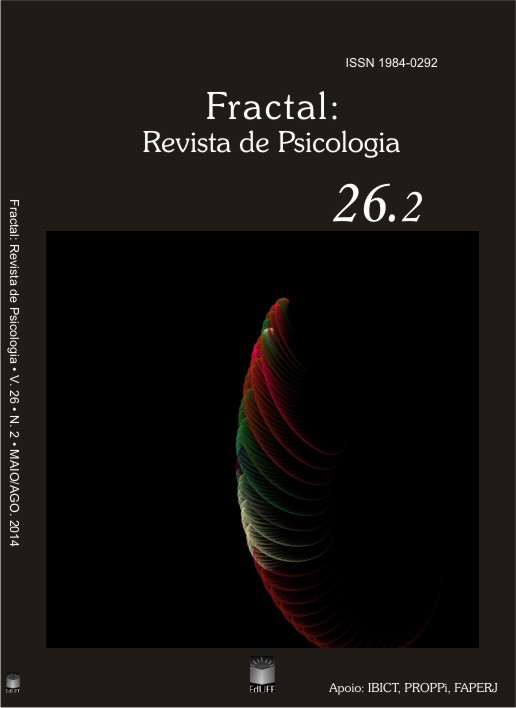Tópicos para uma boa análise de dados de estudos empíricos
Palabras clave:
análise de dados, estatística, teste de hipóteses, comunicação de dadosResumen
Este artigo discute o processo de análise de dados em sete tópicos: a) modelos estatísticos, técnicas estatísticas e diferenciação de “receita estatística”; b) a associação da validade das conclusões estatísticas ao processo de delineamento e amostragem; c) a diferença e complementaridade da descrição de dados e do teste de hipóteses; d) como as hipóteses se relacionam com os testes estatísticos a realizar; e) a análise preliminar de dados e sua relevância; f) teste de hipótese na perspectiva de Fisher e de Neyman e Pearson; g) a apresentação dos dados como um processo comunicacional, e vantagens do uso de normas (APA).Descargas
Citas
Azevedo, M.; Garcia-Marques, T. Que Confiança podemos ter nas conclusões estatísticas que apresentamos? Psicologia, Lisboa, v. 11, n. 1, p. 151-168, 1996.
Barnett, V.; Lewis, T. Outliers in Statistical Data. 3rd ed. Chichester, England: John Wiley & Sons, 1994.
Behrens, J. T. Principles and procedures of exploratory data analysis. Psychological Methods, [S.l.], v. 2, n. 2, p. 131-160, 1997.
Breckler, S. J. Application of covariance structure modeling in psychology: cause for concern? Psychological Bulletin, [S.l.], v. 107, n. 2, p. 260-273, 1990.
Cohen, J. Statistical power analysis for the behavioral sciences. 2nd ed. Hillsdale, NJ: Lawrence Erlbaum, 1988.
Ferketich, S.; Verran, J. An overview of data transformation. Research in Nursing and Health, [S.l.], v. 17, n. 5, p. 393-396, 1994.
Garcia-Marques, T. A hipótese de estudo determina a análise estatística: um exemplo com o modelo ANOVA. Análise Psicológica, [S.l.], v. 15 n. 1, p. 19-28, 1997.
Garcia-Marques, T.; Azevedo, M. A inferência estatística múltipla e os erros tipo I: um problema de inflação do alfa. Psicologia, [S.l.], n. 10, p. 1-11, 1995.
Gigerenzer, G. The superego, the ego, and the id in statistical reasoning. In: Keren, G.; Lewis, C. (Ed.). A handbook for data analysis in the behavioral sciences: methodological issues. Hillsdale, NJ: Erlbaum, 1993. p. 311-339.
Gigerenzer, G. Mindless statistics. The Journal of Socio-Economics, [S.l.], v. 33, p. 587–606, 2004
HUBBARD, R.; RYAN, P. A. The historical growth of statistical significance testing in psychology and its future prospects. Educational and Psychological Measurement, v. 60, n. 5, p. 661-681, 2000.
Keselman, H. J. et al. Statistical practices of educational researchers: An analysis of their ANOVA, MANOVA, and ANCOVA analyses. Review of Educational Research, [S.l.], v. 68, n. 3, p. 350-386, 1998.
LEWIN, K. Field theory in social science: selected theoretical papers by Kurt Lewin. London: Tavistock, 1952.
Maxwell, S. E. The persistence of underpowered studies in psychological research: causes, consequences, and remedies. Psychological Methods, [S.l.], v. 9, n. 2, p. 147-163, 2004.
Micceri, T. The unicorn, the normal curve, and other improbable creatures. Psychological Bulletin, [S.l.], v. 105, n. 1, p. 156-166, 1989.
ROSNOW, R. L.; ROSENTHAL, R. Statistical procedures and the justification of knowledge in psychological science. American Psychologist, v. 44, n. 10, p. 1276-1284, 1989.
Schmidt, F. L. Statistical significance testing and cumulative knowledge in psychology: implications for training of researchers. Psychological Methods, [S.l.], v. 1, n. 2, p. 115–129, 1996
Thompson, B. (Ed.). Planned versus unplanned and orthogonal versus nonorthongonal contrasts: the neo-classical perspective. In ______. Advances in social science methodology. Greenwich, CT: JAI Press. 1994. v. 3, p. 3-27.
Thompson, B. What future quantitative social science research could look like: confidence intervals for effect sizes. Educational Researcher, [S.l.], v. 31, n. 3, p. 25–32, Apr. 2002.
Wilkinson, L.; APA Task Force on Statistical Inference. Statistical methods in psychology journals: guidelines and explanations. American Psychologist, [S.l.], v. 54, n. 8, p. 594–604, 1999. Disponível em: <http://www.apastyle.org/manual/related/wilkinson-1999.pdf>. Acesso em: 20 abr. 2013.
WRIGHT, D. B. Making friends with your data: improving how statistics are conducted and reported. British Journal of Educational Psychology, [S.l.], v. 73, n. 1, p.123–136, 2003.
##submission.downloads##
Publicado
Cómo citar
Número
Sección
Licencia
Autores que publicam nesta revista concordam com os seguintes termos:
- Autores mantém os direitos autorais e concedem à revista o direito de primeira publicação, com o trabalho simultaneamente licenciado sob a Creative Commons Attribution License que permitindo o compartilhamento do trabalho com reconhecimento da autoria do trabalho e publicação inicial nesta revista.
- Autores têm autorização para assumir contratos adicionais separadamente, para distribuição não-exclusiva da versão do trabalho publicada nesta revista (ex.: publicar em repositório institucional ou como capítulo de livro), com reconhecimento de autoria e publicação inicial nesta revista.

This work is licensed under a Creative Commons Attribution 4.0 International License.

Na medida do possível segundo a lei, a Fractal: Revista de Psicologia renunciou a todos os direitos autorais e direitos conexos às Listas de referência em artigos de pesquisa. Este trabalho é publicado em: Brasil.
To the extent possible under law, Fractal: Revista de Psicologia has waived all copyright and related or neighboring rights to Reference lists in research articles. This work is published from: Brasil.






